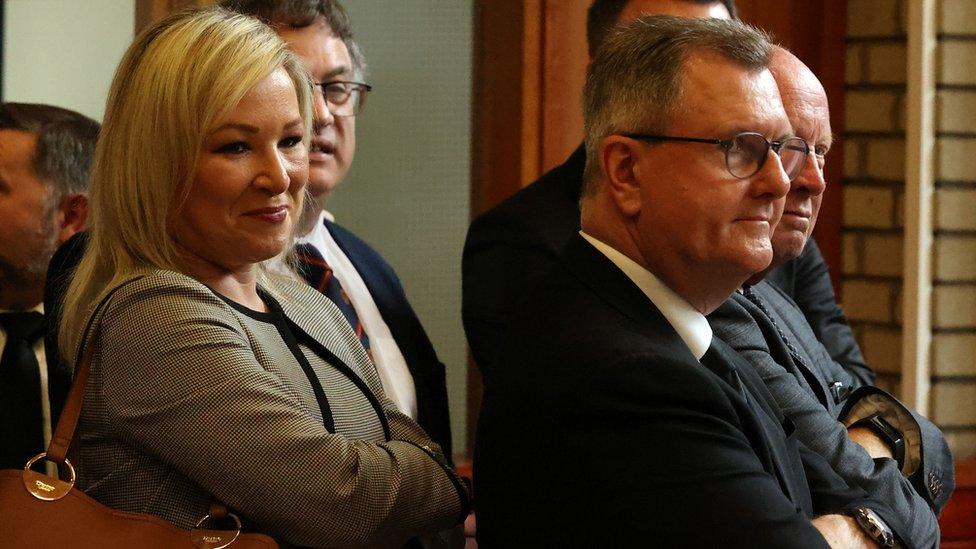Stormont: Sinn Féin and DUP will lead Windsor Framework committee
- Published
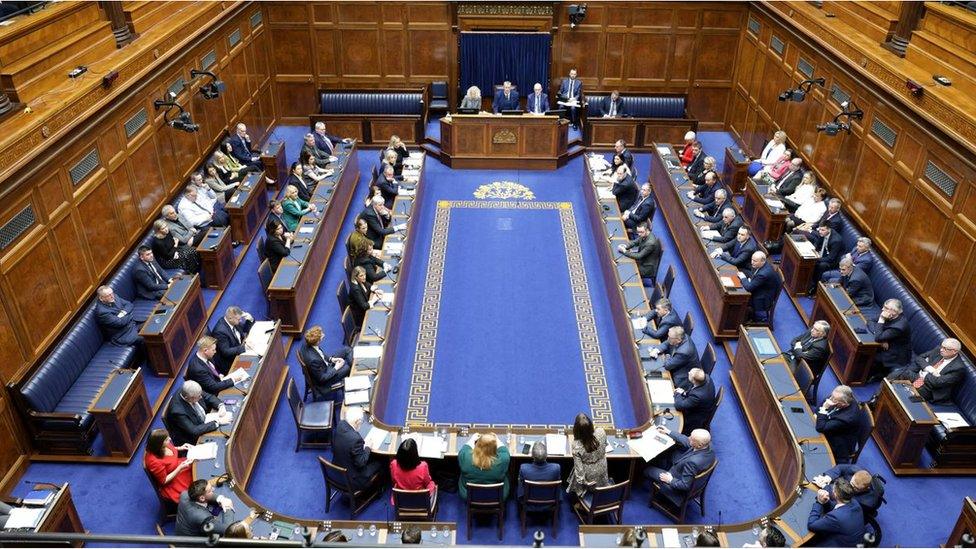
The Northern Ireland Assembly was restored on Saturday
Sinn Féin and Democratic Unionist Party (DUP) assembly members have been appointed to lead a new committee scrutinising the Windsor Framework.
The committee will consider updates to EU law which might apply to NI and report back on their significance.
Sinn Féin MLA Declan Kearney will chair the committee while the DUP's David Brooks will be the vice-chairman.
The assembly has reconvened following a restoration of Stormont's power-sharing institutions after a two-year hiatus.
The committee was planned as part of the Windsor Framework deal agreed in 2023 by the UK and EU to address concerns over post-Brexit trade checks between the region and Great Britain.
On Tuesday, parties nominated assembly members to take up chair and deputy chair positions for committees - groups to scrutinise the work of executive ministers and their departments.
Sinn Féin chose both chairperson posts in the committee examining the Department for Communities, which is headed by DUP minister Gordon Lyons.
And the DUP took up both chairperson positions in the economy committee, which will scrutinise the work of Sinn Féin minister Conor Murphy.
The Social Democratic and Labour Party (SDLP), which will act as the official opposition in the new assembly, appointed Daniel McCrossan as chairman of the Public Accounts Committee.
Sinn Féin's Carál Ní Chuilín was also elected as principal deputy speaker - one of three deputy speakers who assist Speaker Edwin Poots in chairing meetings.

Committee chairs/vice-chairs
Economy
Philip Brett (DUP)/Gary Middleton (DUP)
Finance
Matthew O'Toole (SDLP)/Diane Forsythe (DUP)
Education
Nick Mathison (Alliance)/Pat Sheehan (Sinn Féin)
Health
Liz Kimmins (Sinn Féin)/Nuala McAllister (Alliance)
Communities
Colm Gildernew (Sinn Féin)/Ciara Ferguson (Sinn Féin)
Infrastructure
Deborah Erskine (DUP)/John Stewart (UUP)
Agriculture
Tom Elliott (UUP)/Declan McAleer (Sinn Féin)
Executive Office
Paula Bradshaw (Alliance)/Connie Egan (Alliance)
Justice
Joanne Bunting (DUP)/Deirdre Hargey (Sinn Féin)
Windsor Framework Democratic Scrutiny
Declan Kearney (Sinn Féin)/David Brooks (DUP)
Public Accounts
Daniel McCrossan (SDLP)/Cheryl Brownlee (DUP)
Standards and Privileges
Philip McGuigan (Sinn Féin)/Danny Donnelly (Alliance)

At the start of Tuesday's proceedings Mr Poots addressed an issue which had made headlines.
He told the assembly no connotation should be drawn from remarks in which he said he would have Traditional Unionist Voice (TUV) leader Jim Allister's "clock cleaned".
The DUP assembly member was responding after Mr Allister raised questions over the comments made on Monday on BBC Radio Ulster's Good Morning Ulster.
They had followed Mr Allister suggesting Mr Poots' appointment as Speaker had been a trade-off in return for Mr Poots supporting the DUP's return to Stormont power-sharing.
Mr Poots told the programme: "I couldn't respond to Mr Allister, and he certainly would have had his clock cleaned if I could have."
Mr Allister later said the comments meant that "Mr Impartial Speaker... is now on the record as saying he would like to deck me".
In the assembly on Tuesday, Mr Allister asked Mr Poots: "Given the dignity and expectations of your office, how was it compatible for you to publicly vent your desire to 'clean my clock', which has the colloquial and indisputable meaning of indulging in physical violence?"
Mr Poots said he felt the assembly member for North Antrim was "being a little sensitive".
Smiling, he said he meant that "had I had the opportunity to put you right, I would have put you right on that occasion".
But he said "no other connotation should be taken from it" as that would be "entirely disingenuous and misleading".
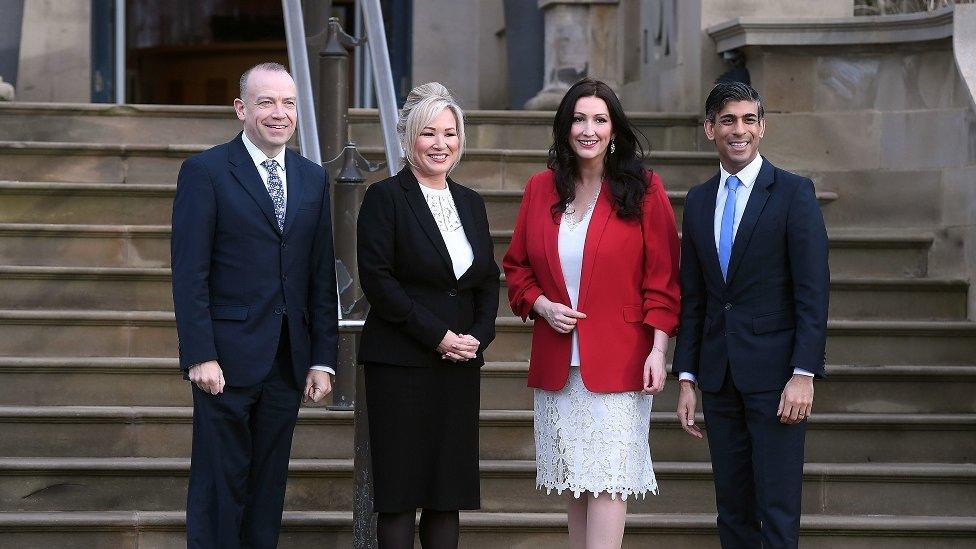
NI Secretary Chris Heaton-Harris, First Minister Michelle O'Neill, Deputy First Minister Emma Little-Pengelly and Prime Minister Rishi Sunak at Stormont Castle on Monday
NI secretary in the US
Meanwhile, Northern Ireland Secretary Chris Heaton-Harris has travelled to the United States to discuss the return of Stormont with members of Congress.
It follows US trade envoy Joe Kennedy III visiting Northern Ireland last week.
Mr Heaton-Harris said he would also update groups in Washington DC on the government's Troubles legacy act and plans for an inquiry into the 1998 Omagh bomb.
How did we get here?
The return of power sharing came after months of negotiations involving the government and the Democratic Unionist Party (DUP), Northern Ireland's largest unionist party.
It withdrew from power sharing in February 2022 in protest at post-Brexit trade arrangements for Northern Ireland, agreed between the UK and EU.
Last week, DUP leader Sir Jeffrey Donaldson announced his party had reached a deal with Number 10 addressing unionist concerns.
He said on this basis, and with legislation passed at Westminster to implement the proposals, his party would return to government.
That decision culminated in the restoration of the devolved institutions on Saturday, two years to the day since the DUP withdrew its first minister from the executive.

More on power sharing in Northern Ireland
FIRST MINISTER PROFILE Who is Michelle O'Neill?
DEPUTY FIRST MINISTER PROFILE: Who is Emma Little-Pengelly?
ANALYSIS: Balancing act ahead for first minister
BACKGROUND: A history of NI agreements (and disagreements)
- Published5 February 2024
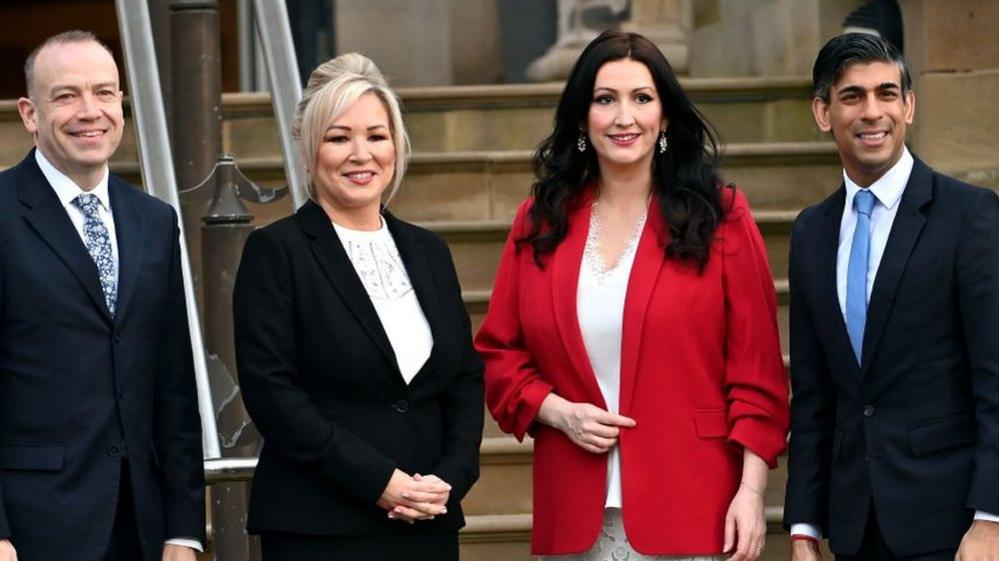
- Published5 February 2024
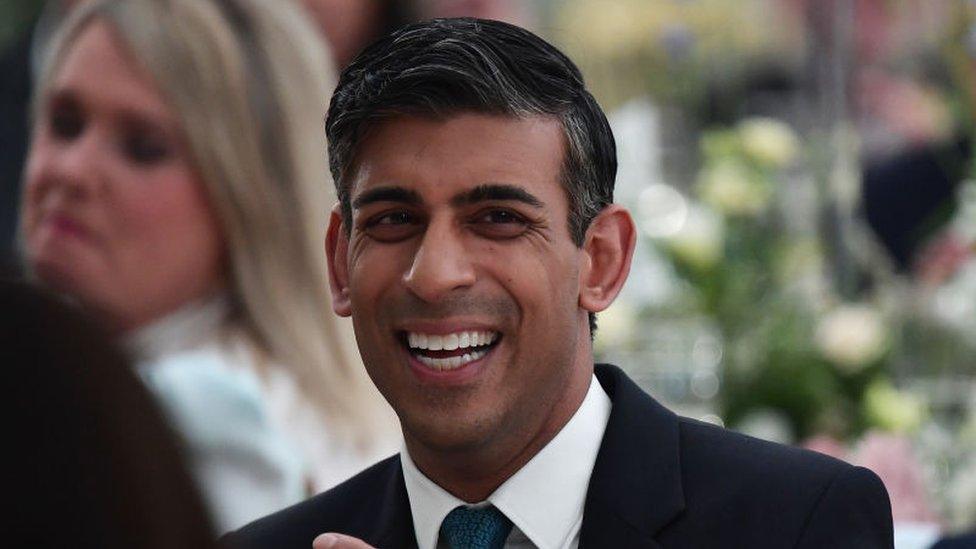
- Published4 February 2024
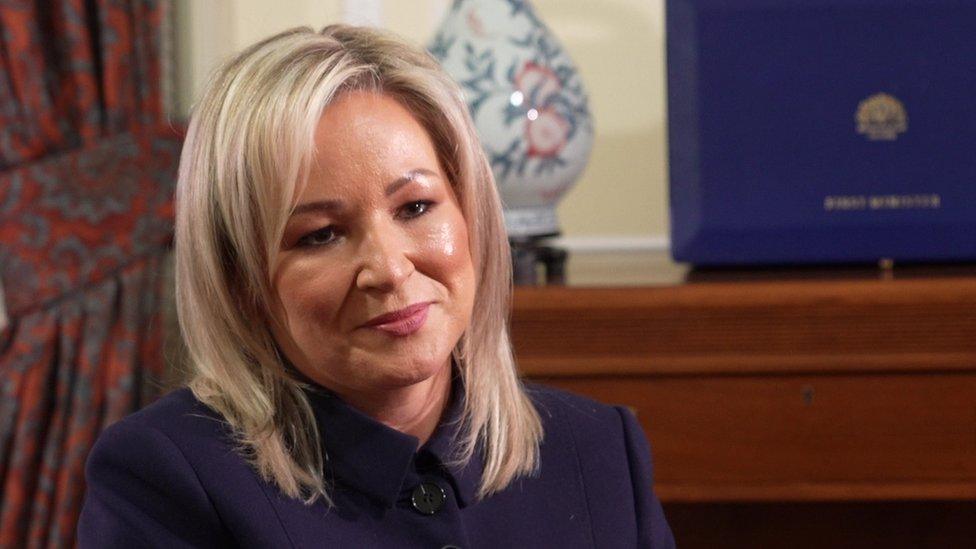
- Published3 February 2024
